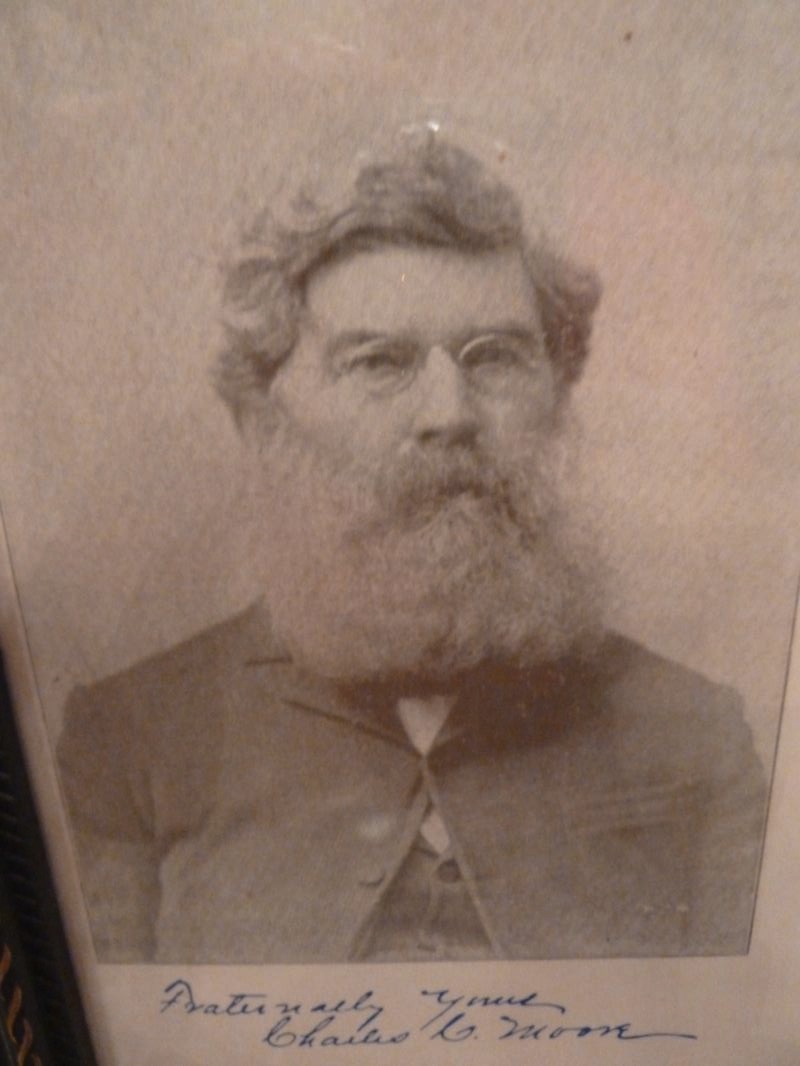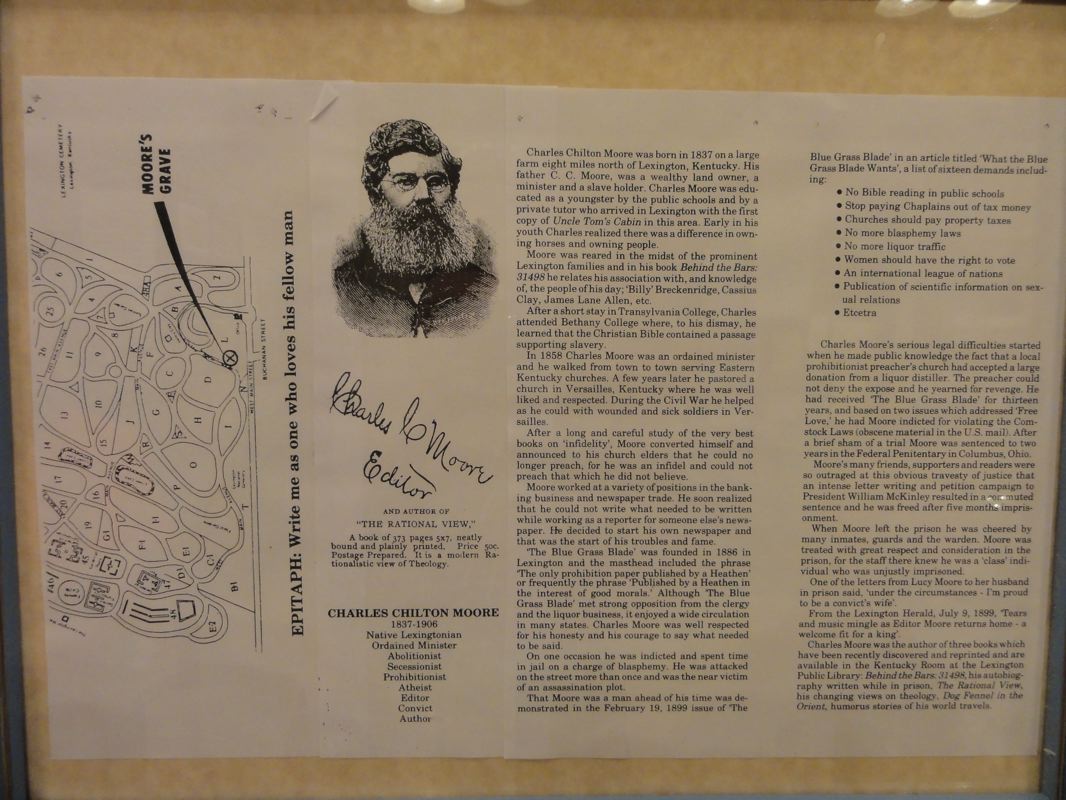Charles Chilton Moore
1837-1906
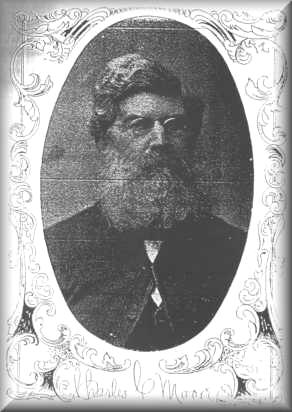
C.C. Moore was the grandson of Barton W. Stone. At one time he was a faithful gospel preacher. He preached for the Church of Christ at Versailles, Kentucky. After much trouble over the teachings of the Bible, he declared to the elders that he had become and infidel, and left the church. Among other issues, he reasoned that a study of geology showed the world to be much older that Ussher's dating the age of the earth at 4000 B.C. This among other issues continued to move him further and further away from trusting in the God of the Bible. Over the course of the next few years he became a deist, then later an agnostic, then ultimately an atheist.
Moore was the editor of one of the nation's first journals promoting atheism, Blue Grass Blade. He received great rejections from theists and creationists. He spent numerous occasions in prison because of his outspoken attacks on the Bible and theology. His autobiography, Behind The Bars, was written while in prison for free-love articles appearing in his paper. In 1900, in the case of United States v. Moore, the District Court D., Kentucky, ruled that a publication to be prohibited from the mail system, it must be lewd and lascivious as well as obscene, and that it could not be banned because it offends the religious sentiments of the majority of the people by attacking the doctrine of the immaculate conception of Christ, even though worded in coarse or obscene language. The court went on to say that a publication must have a tendency to induce sexual immorality. Moore was one of the last men in America to be sent to prison for blasphemy. However, he was pardoned by President William McKinley.
Webmaster's Note: Moore is added to this website for numerous reasons. One in particular is that men have the right to choose to obey God or not. Even though Moore was a member of a noted family, the Stones, who gave themselves wholeheartedly to the cause of Christ, not every one in that family chose to go the same direction. It has been said that we are one generation away from apostasy. Here is an extreme example of how it can happen. Another reason for including Moore, is that if you plan to go to Lexington to see all those who fought the good fight of faith, it only seems reasonable to see one who was equally respected among a group completely opposed to the faith. Moore, to atheists, is one of the fathers of atheism in America. See the brief biographical sketch I discoved while visiting the Cane Ridge Museum in May, 2011. It depicts C.C. Moore in a most favorable way.
Also Note: Much thanks to Michael Adcock, who has researched the life of C.C. Moore extensively, for making the photo of Moore available to us, as well as helping to make corrections on some of the details in the brief description of Moore's life above. Also thanks are extended to Jan Ewing for researching further info on the website.
![]()
Backpiece Picture On His Book, Behind The Bars:31498
![]()
Display In Cane Ridge Museum
Cane Ridge, Kentucky
Charles C. Moore
1837-1906
Native Lexingtonian
Ordained Minister
Abolitionist
Secessionist
Prohibitionist
Atheist
Editor
Convict
Author
Charles Chilton Moore was born in 1837 on a large farm eight miles north of Lexington, Kentucky. His father C.C. Moore, was a wealthy land owner, a minister and a slave holder. Charles Moore was educated as a youngster by the public schools and by a private tutor who arrived in Lexington with the first copy of Uncle Tom's Cabin in this area. Early in his youth Charles realized there was a difference in owning horses and owning people.
Moore was reared in the midst of the prominent Lexington families and in his book Behind the Bars: 31498 he relates his association with, and knowledge of, the people of his day; 'Billy' Breckenridge, Cassius Clay, James Lane Allen, etc.
After a short stay in Transylvania College, Charles attended Bethany College where, to his dismay, he learned that the Christian Bible contained a passage supporting slavery.
In 1858 Charles Moore was an ordained minister and he walked from town to town serving Eastern Kentucky churches. A few years later he pastored a church in Versailes, Kentucky where he was well liked and respected. During the Civil War he helped as he could with wounded and sick soldiers in Versailles.
After a long and careful study of the very best books on 'infidelity,' Moore converted himself and announced to his church elders that he could no longer preach, for he was an infidel and could not preach that which he did not believe.
Moore worked at a variety of positions in the banking business and newspaper trade. He soon realized that he could not write what needed to be written while working as a reporter for someone else's newspaper. He decided to start his own newspaper and that was the start of his troubles and fame.
"The Blue Grass Blade" was founded in 1886 in Lexington and the masthead included the phrases 'The only prohibition paper published by a Heathen' or frequently the phrase 'Published by a Heathen in the interest of good morals.' Although 'The Blue Grass Blade' met strong opposition from the clergy and the liquor business, it enjoyed a wide circulation in many states. Charles Moore was well respected for his honesty and his courage to say what needed to be said.
On one occasion he was indicted and spent time in jail on a charge of blasphemy. He was attacked on the street more than once and was the near victim of an assassination plot.
That Moore was a man ahead of his time was demonstrated in the February 19, 1899 issue of 'The Blue Grass Blade' in an article titled, 'What the Blue Grass Blade Wants,' a list of sixteen demands including:
-No Bible reading in public schools
-Stop paying Chaplains out of tax money
-Churches should pay property taxes
-No more blasphemy laws
-No more liquor traffic
-Women should have the right to vote
-An international league of nations
-Publication of scientific information on sexual relations
-Etcetra
Charles Moore's serious legal difficulties started when he made public knowledge the fact that a local prohibitionist preacher's church had accepted a large donation from a liquor distiller. The preacher could not deny the expose and he yearned for revenge. He had received 'The Blue Grass Blade' for thirteen years, and based on two issues which addressed 'Free Love,' he had Moore indicted for violating the Comstock Laws (obscene material in the U.S. mail). After a brief sham of a trial Moore was sentenced to two years in the Federal Penitentary in Columbus, Ohio.
Moore's many friends, supporters and readers were so outraged at this obvious travesty of justice that an intense letter writing and petition campaign to President William McKinley resulted in a commuted sentence and he was freed after five months imprisonment.
When Moore left the prison he was cheered by many inmates, guards and the warden. Moore was treated with great respect and consideration in the prison, for the staff there knew he was a 'class' individual who was unjustly imprisoned.
One of the letters from Lucy Moore to her husband in prison said, 'under the circumstances - I'm proud to be a convict's wife.'
From the Lexington Herald, July 9, 1899, 'Tears and music mingle as Editor Moore returns home - a welcome fit for a king.'
Charles Moore was the author of three books which have been recently discovered and reprinted and are available in the Kentucky Room at the Lexington Public Library: Behind the Bars: 31498, his autobiography written while in prison. The Rational View, his changing views on theology, Dog Fennel in the Orient, humorous stories of his world travels.
-Content of Pamphlet On Display In Cane Ridge Museum
![]()
Directions To The Grave Of Charles C. Moore
Directions To Grave: Lexington Cemetery is one of the most beautiful old cemeteries in America. It is located on West Main Street heading away from downtown Lexington toward Leestown Pike. Turn right into the main entrance past the office. Once inside the gates take the second turn to the left that leads up to the front of the Clay Monument. Then turn left onto West Main Avenue. As you turn left and pass the Clay Monument, look to your left, and the graveyard goes down toward a lower area. Moore's grave is down in this area. It is suppose to be in Section L, but it is not posted. If you get down to the sign identifying Section "L" you've gone too far.
GPS Location of the grave:
38°03'24.8"N 84°30'30.9"W
or D.d. 38.056900, -84.508583
14 Ft. Accuracy
Grave Faces Northwest
Section L, Lot 71, Part N2/3
![]()
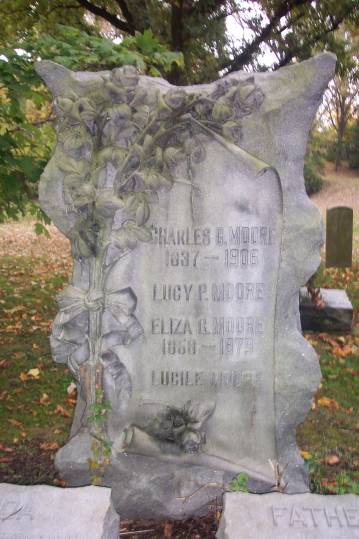
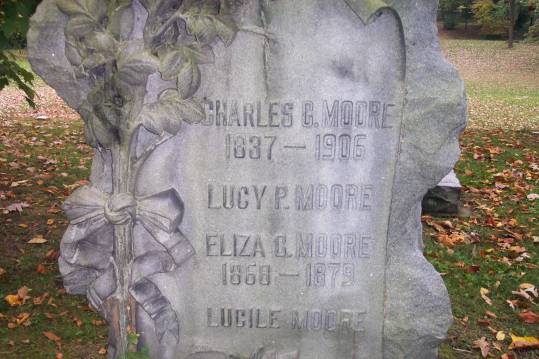
Charles C. Moore
1837-1906
Lucy P. Moore
Eliza C. Moore
1868 - 1879
Lucile Moore
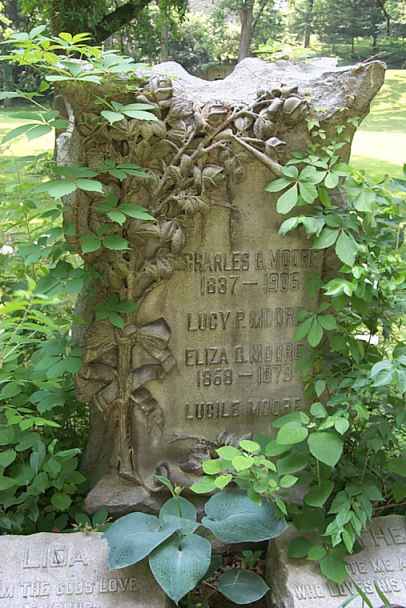
![]()
See Where Moore Is Buried At Lexington Cemetery, Lexington Kentucky
![]()
